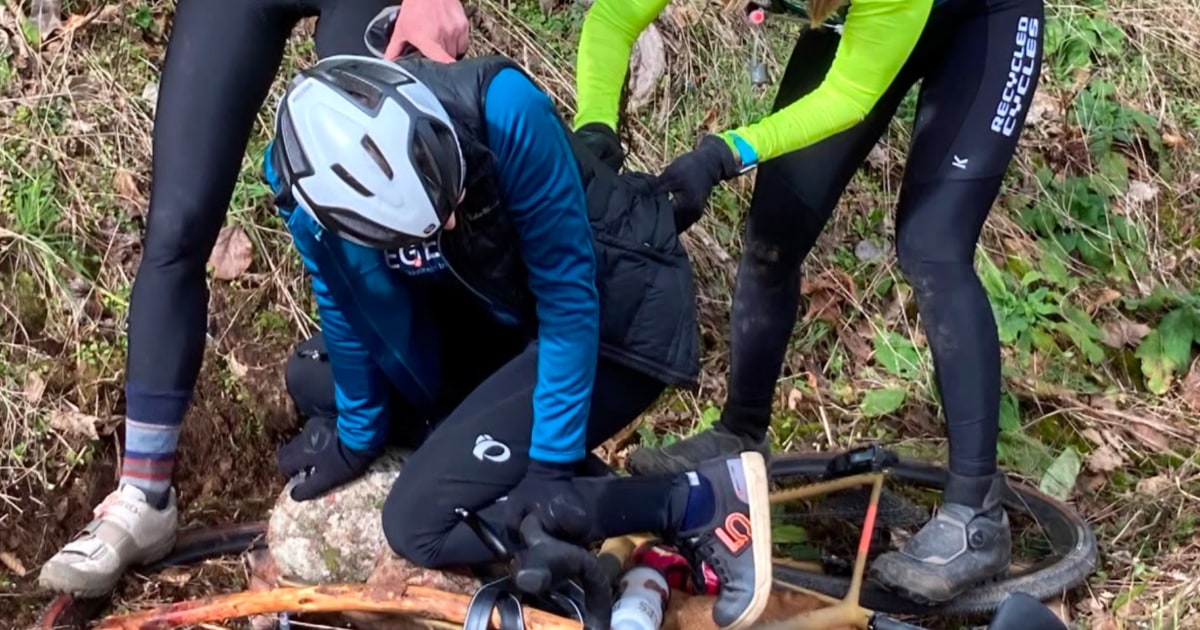The cat dialed back pressure through its crushing jaws, and the friend was able to pull away, fellow cyclists said in an interview one month after the incident east of Seattle.
A group of Seattle-area cyclists who helped one of their own escape the jaws of a cougar recounted their story this weekend, saying they fought the cat and pinned it down.
The woman who was attacked, Keri Bergere, sustained neck and face injuries and was treated at a hospital and released following the Feb. 17 incident on a trail northeast of Fall City, the Washington Department of Fish and Wildlife said in a statement.
Bergere said she spent five days at an area hospital and was still recovering.
Fish and Wildlife Lt. Erik Olson called the actions of her fellow cyclists “heroic” in the statement. But the extent of the cyclists’ battle with the 75-pound cat wasn’t immediately clear then.



Yeah this guy doesn’t know what he’s talking about. Bears (brown, not so much black) and wolves don’t see people as prey? Wrong. Humans just cross paths with them less frequently.
Humans may not be the prey of choice for bears and wolves. But that’s the case for mountain lions too.
Wolves almost never see adult humans as prey. Since 1761, only 77 non-fatal attacks and 40 fatal attacks from wolves. However, of those 40, only 9 occurred in the last 100 years and 2 of them were death from rabies. Many of the non-fatal attacks and a few of the fatal attacks were from captive wolves. Most of the attacks involved children and/or pets.
Wolves have been practically extinct in the US for many decades. That’s a major reason why there are so few incidents. However, I agree that viewing adult humans as prey isn’t “typical” wolf behavior.
Would a healthy wolf prefer to hunt a human over other prey? No. But we’re talking about wild animals. If you encounter a wolf in the wild you don’t know if it’s hungry or sick, and the animal may absolutely treat you as prey.
40 since 1791
You’re both wrong, none of them see humans as prey. JFC. None of them want anything to do with humans.
*Downvote all you want. This is fact. People need to be afraid so common parlance has bought into the completely wrong idea that these animals hunt humans. They do not.
This is not fact. This is blind conjecture from an anonymous unqualified user who takes time to respond to down-votes but is too lazy to actually raise a substantive source, or lacks one altogether. Opinion is not fact.
https://www.adn.com/alaska-beat/article/study-most-black-bears-attack-humans-may-see-them-prey/2011/05/11/
Beets, Bears, Battlestar galactica.
Not opinions just facts
I changed my mind. These are 100% fax.
That article said 1) they are out hunting. Not that they are hunting humans, but I’m pretty sure you read it as such. And 2) “testing you out as a possible prey item,” said Dr. Herrero, a professor emeritus at the Univ". Testing mf testing. By bears in deep country that don’t have much experience with humans. They do not default think that you are prey. I’ve had bears size me and you can just see their mind is ‘what are you, hey you’re not prey’ before wandering off.
Anyway what I wanted to convey is that normal behavior (which is the vast vast majority of behavior) these animals do not see humans as prey. But yes in the very, very rare occasions they attack humans, a portion of that can be something went wrong in their brain or in the situation and they may have seen you as prey. This is extraordinarily rare, as you can see by the rareness of attacks to even begin with. But people want to read that as normal behavior is hunting humans as prey, which it’s not. It’s the edge case. There’s a huge difference which I hope you now see.
As someone who actually lives amongst them all, they mostly aren’t all that much of a threat to your safety. But yes, they will eat you if hungry enough. Which they can be when it gets cold and the snow is deep, and you can be sure your ass will eat just as good as a deer. And you might be easier to catch to boot since good cardio training only goes so far.
If they are sick, malnourished, or injured and can’t feed their normal way, they may turn to optimistic opportunities (which is still different than hunting and seeing humans as prey). Not if they are hungry or the snow is deep JFC.
Isn’t that just another way to say “hungry”? And are they not more likely to be “sick, malnourished, and injured” when it’s winter time? JFC
Nor did I claim they were all that much of a danger under normal circumstances. But, they are wild animals and therefore unpredictable in their actions. While I do not fear their presence, I do understand things can go sideways very, very quickly despite everyone’s best intentions otherwise. And it pays me to be aware of my surroundings even in my yard when grilling a hamburger or out in the forest foraging for mushrooms and berries as the seasons dictate.
All animals are hungry. Only a very, very few are sick, malnourished or injured - which are the ones that turn to opportunistic opportunities and attacks. Not the same at all.
All it takes is one.
How about polar bears?
Now Polar bears think everything that moves is food. But you’re not going to run into one of those on your weekend stroll.
You don’t know where I stroll.